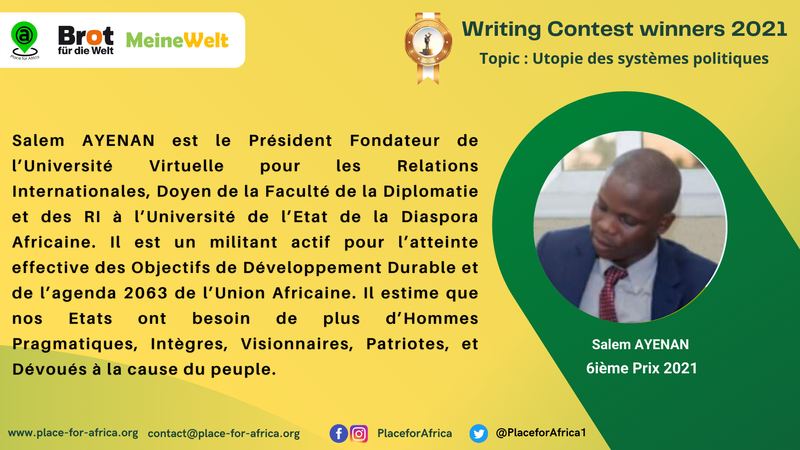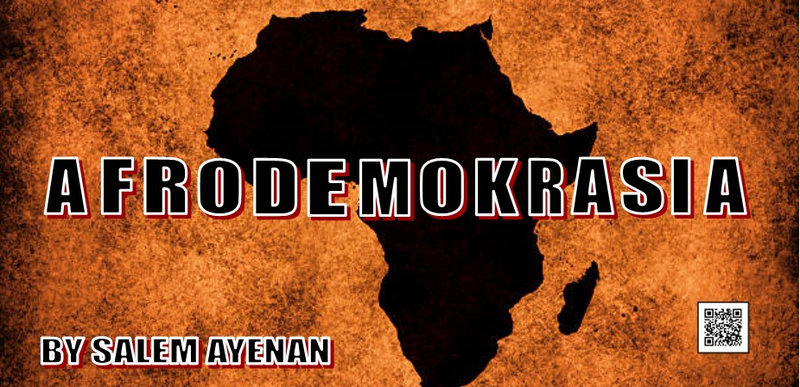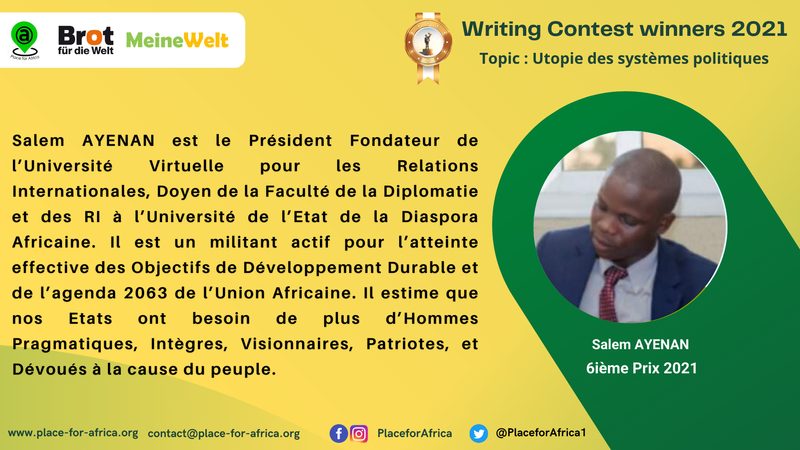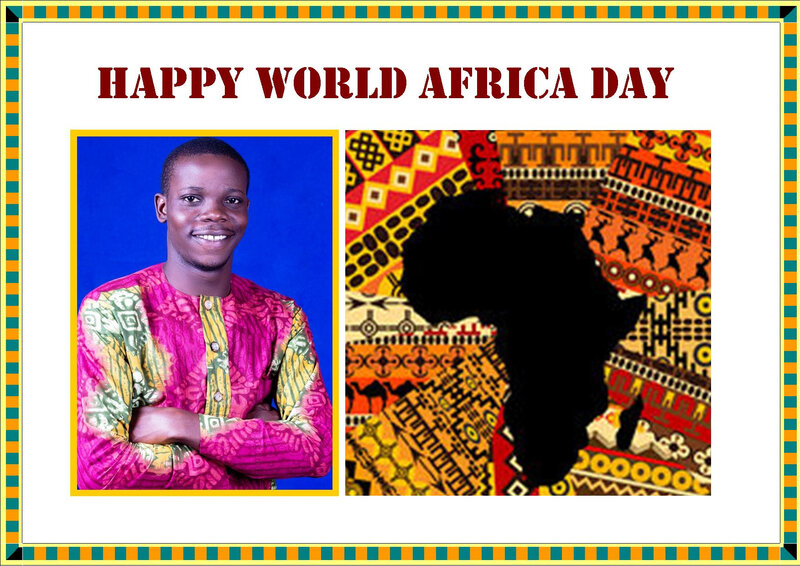Project ECOL'ECOLO

History of the ECOL’ECOLO Project
In February 2022, Salem AYENAN, Climate Activist was selected out of more than 200 applications by the Major Group of Children and Young People of the United Nations Environment Programme, in order to implement the Youth Assembly for the Environment in the Africa region, as a prelude to the Assembly United Nations on the Environment held in Kenya from February 28 to March 02, 2022. More than 117 Organizations of Civil Society, hundreds of young women and men activities, groups of vulnerable people took part in the four days of conferences, consultations and dialogues. This Assembly has known the participation of Students from Senghor University of Alexandria.
Find here the report of this Assembly:
https://drive.google.com/file/d/1m02nCmEBaX605RScVJZFvHpQzL_gDeaA/view?usp=sharing
Here you will find some images taken during the activities:
https://drive.google.com/file/d/1vXSnImeDfYdclIQaAqSqhy0MfbgJUpVW/view?usp=sharing
Here is the Facebook page created for AYEA 2022:
https://www.facebook.com/AfricanYouthEnvironmentAssembly/.
The various resolutions resulting from this Assembly have clearly indicated the need for urgent action to save our dying planet. The question of quality education on the Sustainable Development Goals for children and young people, especially climate change was highlighted and hammered home on several occasions. This is how Salem AYENAN and his team set up the ECOL'ECOLO project for learners in schools and colleges in order to overcome the problems identified in the sector.
What is ECOL'ECOLO? (Vision, Mission and Goals).
ECOL’ECOLO is a theoretical and practical education project on climate change in schools, with the creation of school gardens to solve the food shortage in school canteens.
Our vision is to have a new generation of children and young goodwill ambassadors by 2030 militant for the preservation of our planet and who constitute changemakers par excellence who transform positively the world.
For this, we have set ourselves the mission of supporting learners in education through theoretical and practical lessons.
Our general objective is to educate, train children and young people on climate change by means of theoretical knowledge and practical activities. We specifically aim to:
- Set up within schools and colleges theoretical and practical training programs on Sustainable Development, particularly on issues related to the Environment and Climate Change.
- Encourage schools to become places of learning and implementation par excellence of best practices environmental practices and in compliance with environmental standards.
- Carry out practical activities likely to transform learners psychologically, socially, teachers, parents and at the same time generate pecuniary benefits for schools, women in situation of vulnerability and single mothers.

ACTIVITIES
ECOL’ECOLO is a multi-pronged project, but the end goal remains the same: to have a new generation of children and young goodwill ambassadors campaigning for the preservation of our planet and who constitute changemakers par excellence who positively transform the world.
The activities that we already carry out in the implementation of the project are:
- Theoretical and practical training on climate change: We use poetry, singing, storytelling, painting, drawing to teach learners what climate change is, what are its causes, events and consequences.
- Training on the manufacture of biodegradable packaging and awareness on the use of towels reusable sanitary pads for teenagers and young girls during menstruation.
- Planting of plants followed by awareness session with learners, teachers and parents.
- Establishment of a school garden to facilitate access to food for all in school canteens.
The activities we plan to carry out in the coming months and years are:
- Organization of a local competition between schools in the same region on the Sustainable Development Goals.
- Organization of a National Festival of Children and Youth on the Sustainable Development Goals (FESNODD Benin).
- The Special Prize for Schools and Colleges respecting good environmental practices.

RESULTS
ECOL’ECOLO, a project born a few months ago has already started producing results exceptionally beautiful.
The visible results already observed in the execution of the ECOL’ECOLO project:
- Learners understand the history of Climate Change, its causes, manifestations and consequences, as well as their responsibility in the environmental protection.
- Teachers are more and more interested in themes related to Sustainable Development and try to integrate them during their teachings.
- Parents of learners begin to become familiar with the preservation of the environment, seeing a change in behavior, and in children's attitudes towards their environment.
- Schools are clean compared to what that it was well before the talks debates on the Environmental Protection.
- The majority of learners benefiting from practical training no longer buy in plastic bags, and manufacture by themselves biodegradable packaging for uses temporary.
- School canteens have fewer problems in the supply of food to all learners thanks to the school garden set up and which is maintained by the learners under the leadership of volunteers on the project with the teacher competition.
- Women in vulnerable situations and young mothers manage to find cash income thanks to their commitment to the project.
The results we hope for in the coming months and coming years :
- Have learners well trained on the Climate change and able to form other friends in neighborhoods, places of learning and training and others.
- Have parents aware of the issues related to the planet and who are definitely investing in supporting children and young people in fulfillment of their social and civic project at the out of school.
- Have all the schools benefit from this project and adopt good environmental practices.
- Have school gardens in all schools, in Colleges to facilitate access to food by quantity and quality and to ensure safety food for learners.
- Enable women in vulnerable situations and to single mothers to undertake activities income-generating cooperatives.

Difficulties we face and alternatives:
- Availability of learners because of the schedules defined in the training programs by the Ministry of Education. Faced with this situation, we have found alternatives to work with the learners on Wednesday afternoons and Saturday mornings.
- Insufficient parental involvement. We held sessions with parents specifically to better explain to them the merits of this initiative and the benefits for the children and schools in question.
- Lack of technical and financial resources. We need the specific training manuals on climate change, manuals with images and designs to facilitate the transmission of knowledge on sustainable development. We need the materials for the drawing workshops: paint, colored pencils, paper recycled and others. In particular, we need equipment for the installation of a drilling system to facilitate the watering of plants in our school garden. We need the materials to install the garden in other schools that will benefit from the same project (hoe, cutter, rakes, watering can, gloves and other gardening equipment). We have also need strategic partners for the monitoring and evaluation of this project, without forgetting the involvement of all stakeholders.
- Insufficient human resources. We work in team and we need more young trainers and facilitators on the project, whether for training both theoretical and practical. We are thinking of expanding our teams by next year, and we are working on the plan to remuneration of volunteers who will be deployed on the ground in order to be able to facilitate their movement and restoration.
- Technical and strategic support for Ministries and institutions. We are in the process of completing the pilot phase of this project and we are going to submit the activity report, present our results to the Ministries of Education and the environment.
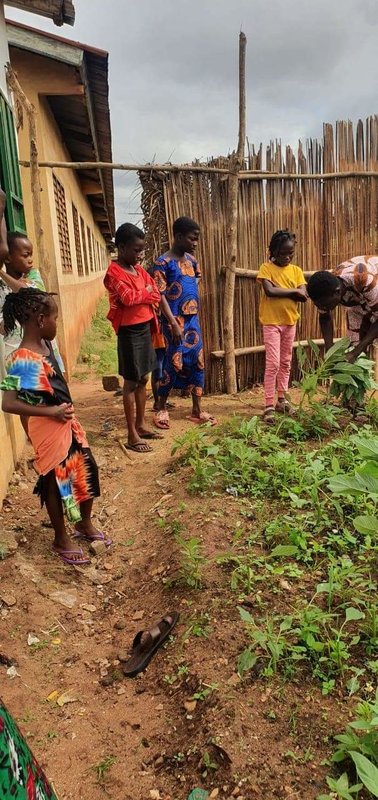
MONITORING – EVALUATION – SUSTAINABILITY PLAN
ECOL'ECOLO in its implementation has a monitoring plan and we make an evaluation at the end of each month. Our team is made up of young committed on sustainable development issues and more specifically activism for climate restoration. We firmly believe that this project comes solve a serious problem and as Nelson Mandela said so well
“Education is the most powerful weapon to change the world”. We want change paradigms and we believe in it with all our energy. That's why that we have plans to replicate ECOL’ECOLO in other schools, to organize festivals each year that bring together children and young people around of the Sustainable Development Goals, to involve Teachers, as well as all stakeholders to collectively positively impact our communities and generations to come.







